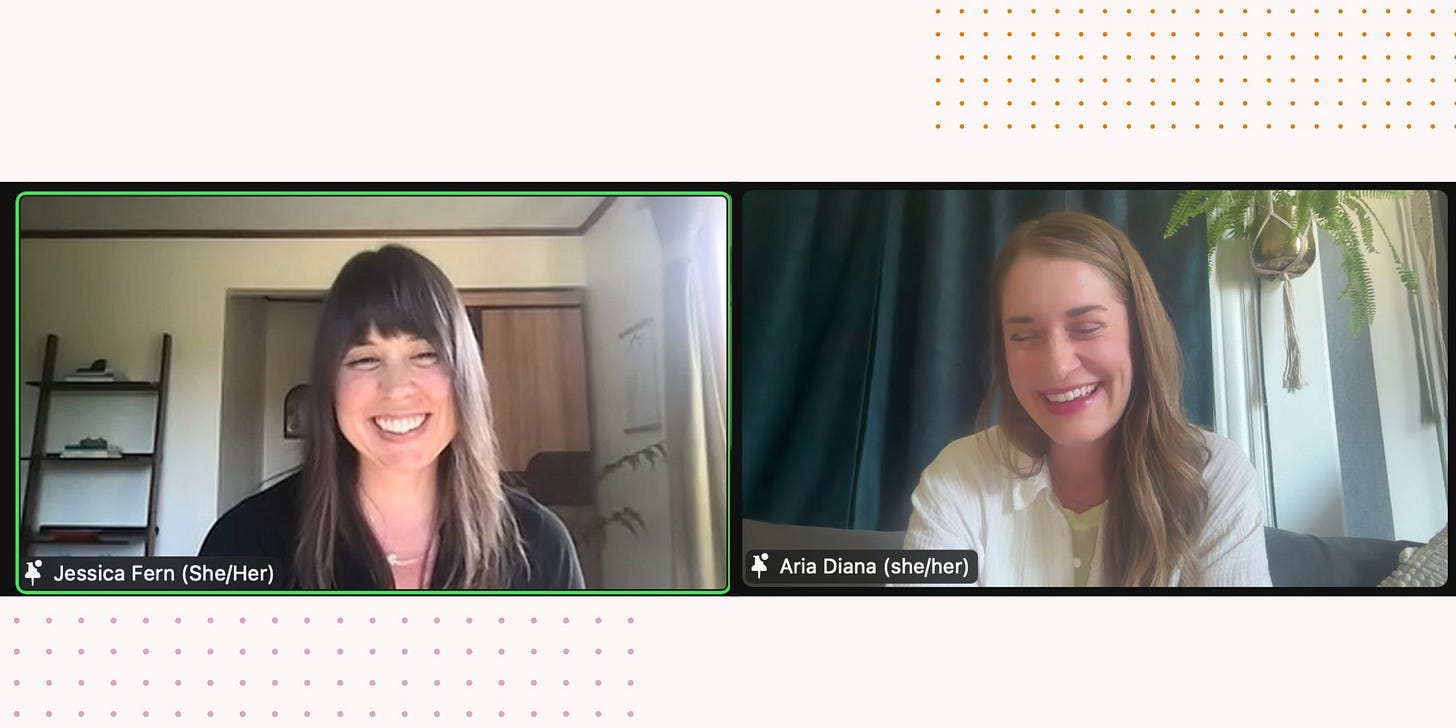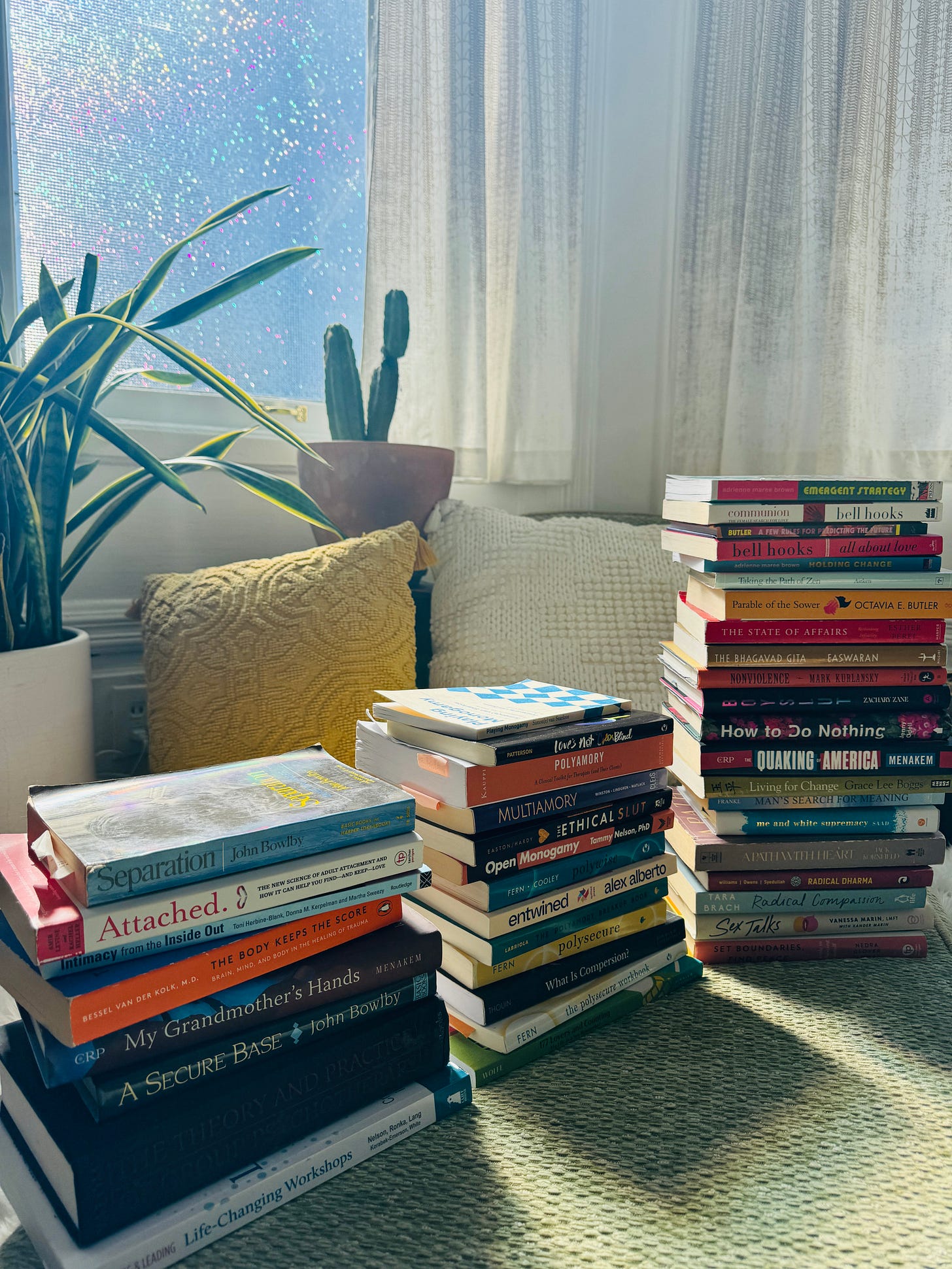Essential Non-Monogamous Reading
The books, teachers and educators that keep me grounded in this work (And celebrating a top 100 spotlight!)
Before we dive in, a little exciting news—and a warm welcome to all the new subscribers who’ve recently joined us!
Thanks to your support, this Substack landed on Substack’s Top 100 “Rising” Culture Leaderboard last week—right alongside folks like Glennon Doyle. 🥳🤓
And since this space is all about exploring relationships with more depth, honesty, and intention—I’d love to hear from you:
✨ What’s something you’re currently navigating in your relationships that you wish there was more support around?
Your responses help shape the topics I write about—and ensure that the content I’m creating is grounded in the real questions and experiences of this community.
Hit the message button below and let me know. I read every one.
What I Keep Recommending (Because They Actually Help)
Whether you're new to consensual non-monogamy or years into your journey, certain books leave a lasting mark—not just in theory, but in how we live, love, and navigate the nuance of complex relationship structures.
I’m constantly reading, integrating, and discussing frameworks that help clients (and myself) deepen into secure, expansive non-monogamous and polyamorous relationships.
I’ve joked that I practice literary non-monogamy—too many good books, not enough time for dates with all of them. 📚💘
For those of you looking to nerd out with me, check out my new curated Bookshop.org storefront, featuring my favorite titles on non-monogamy, somatics, communication, nervous system regulation, and more.
But first—let me share the top 3 polyamory books I return to again and again in my coaching practice, and in my own lived experience.
1. Polyamory: A Clinical Toolkit for Therapists (And Their Clients) by Martha Kauppi
This is hands down the most in-depth, practical, and well-organized book I’ve found on polyamory—and not just for therapists. It’s packed with frameworks, exercises, and real-world applications to help people move from confusion or conflict into clarity and connection.
Martha Kauppi is more than an author to me—she’s also one of my teachers. I'm currently part of her Consensual Non-Monogamy Level 2: Clinical Application Deep Dive Consulting Group, where I meet with other poly-aware therapists and coaches to share case studies and learn from each other's lived experiences and clinical wisdom. I also completed her Level 1 training, which offered a foundational structure for understanding and working with CNM clients in a deeply attuned way. I can’t recommend Martha’s work enough.
If you're a helping professional—or just someone who just wants a more sophisticated lens into relational dynamics as a DIY self-help approach to non-monogamy—this book is gold.
2. Polywise by Jessica Fern and David Cooley
You might already know Jessica Fern from her bestselling book Polysecure, which brought attachment theory into the nonmonogamy space. Polywise is the follow-up—and honestly, I think it’s even better for folks who are in the thick of navigating non-monogamy, especially within long-term partnerships.
Co-written with her co-parent and former partner David Cooley, this book takes a compassionate and grounded approach to common tensions, including time management, power dynamics, repairing ruptures, and the push-pull of connection and autonomy. It invites readers to think critically about their values and agreements, while also offering gentle reminders that we’re all growing—and we get to do that together.
I often recommend both Polysecure and Polywise to clients, as they consistently resonate with folks who are doing the real, messy, brave work of stretching toward secure, self-aware non-monogamy.

3. Multiamory: Essential Tools for Modern Relationships by Dedeker Winston, Jase Lindgren, and Emily Matlack
If you've ever listened to the Multiamory Podcast, you know the hosts are excellent at breaking down big relationship ideas into digestible, research-backed, actionable practices. Their book is no different.
What I love most about Multiamory is how it offers tangible tools for navigating polyamorous (and monogamous!) relationships—without prescribing a one-size-fits-all model. It’s approachable, nonjudgmental, and full of real talk about things like agreements, emotional resilience, and conscious communication.
It’s a great entry point for folks who are just beginning to explore nonmonogamy and for seasoned polyam folks who want a refresher on best practices. Think of it as a Swiss army knife for intentional relationships.
Honorable Mention: What Is Compersion? by Marie Thouin
If you’re curious about compersion—what fosters it, what blocks it, and how to cultivate it—this book is a must. Based on Marie Thouin’s PhD research, it dives into the attitudinal, cognitive, emotional, and behavioral aspects of compersion and offers a radically compassionate lens for understanding jealousy, joy, and interdependence.
I was so inspired by this work that I created a book club series—Composting Competition and Moving Toward Compersion—an 8-hour video journey where my metamour Salina and I read and unpack this book chapter by chapter, offering somatic tools, honest reflections, and the joy (and challenge) of doing the moving toward compersion in real time.
📽 Watch our book club video series
Composting Competition and Moving Toward Compersion
In each episode of this book club video series, Composting Competition and Moving Toward Compersion, my metamour and fellow non-monogamous relationship coach, Salina Mae and I discuss Marie Thouin's new book, "What is Compersion?" chapter by chapter
Explore More of My Book Recs
These are just the beginning. I’ve curated dozens of other reads across topics like identity, trauma healing, decolonial frameworks, conflict resolution, queer love, and somatic embodiment.
📚 Browse my full Bookshop.org storefront here to find the books that speak to your journey.
Let’s keep growing, stretching, and nourishing the ways we love.
Still Reading, Still Stuck? When Learning Isn’t Enough
While I love recommending books like these—and truly believe in the power of knowledge—so many of my clients come to me after reading all the books and still feeling stuck. They’ve had the big conversations, listened to the podcasts, taken the courses. They’ve even worked with therapists who validated their feelings but didn’t offer tools for interrupting unhelpful relational patterns.
They’ve tried to be rational: “It’s just a date,” “They love me, so I shouldn’t be afraid.”
They’ve tried to communicate their needs—only to feel like they’re asking for too much.
They’ve pushed down jealousy, hoping it would go away.
But none of those strategies address what matters most: the nervous system.
Your nervous system doesn’t care what you intellectually understand. It cares about safety. And when your body is sending danger signals, no amount of logic can override the fear.
📍 That’s where somatic work comes in. If you’re ready to explore the emotional roots of your reactions and map out where your triggers live in your body, watch my new Bend Don’t Break Masterclass.






